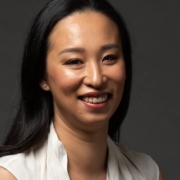Zero To Hero – Cassandra (The change maker)
“Just because a man lacks the use of his eyes doesn’t mean he lacks vision.”. Well said by Stevie Wonder, the blind American singer, songwriter, musician, record producer and …. a multi-instrumentalist. Phewwww!! A man with lots of titles. AMAZING!!
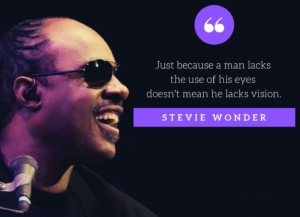
Stevie Wonder
Like him, there is also this lady. Who developed visual impairment, because of a genetic eye disorder named, Stargardt at 8 years old. Hmm.. doesn’t it sound like some science-fiction, space movie, named Star Wars? But in fact, it is a muscular degeneration that causes progressive vision loss, which was named after the German ophthalmologist Karl Stargardt.

Stargardt disease
But this did not stop the beautiful and determined Cassandra, that is her name, from marching forward to a successful position where she is at right now.
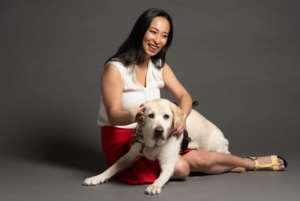
Cassandra was born like any healthy baby, sweet and pleasant. Things were beautiful for her till she turned 2, where she had to attend pre-school childcare which was situated at Outram road. She absolutely hated it and will cry and request for her Dad, who was busy as a chef in a five-star hotel. But “not every day is Sunday”. She slowly got used to that.
When Cassandra turned 4, she was gifted with a cute baby brother, who she will spend most of her time with. Slowly it faded off after leaving Kindergarten, where she was enrolled in Convent of the Holy Infant Jesus (CHIJ) as a Primary 1 student. Things were going good for her, especially during her mid-year examination where Cassandra only got 1-mark short out of the full marks. This made the school even more exciting for Cassandra.
Discovery of the Stargardt disease
But not for long. As she started to receive complains from her teachers for her bad handwriting, incomplete homework and slipping grades for her weekly quiz.
She found it harder and harder to have a suitable handwriting, proper reading and keeping up with what was being taught in the class. Knowing these issues her mother was worried. Suspecting something was wrong, she then took her to visit the eye doctor who then will ask her to read alphabets, numbers and ask her many questions. After that, she had liquids dropped in her eye for dilation (pupil becoming bigger) and asked to wear different glasses. After everything, the doctor prescribed Cassandra with a new set of glasses, which was of no use to her vision.
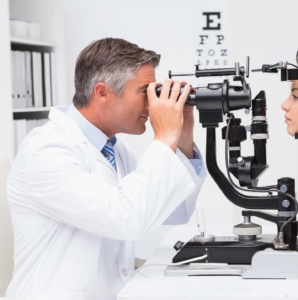
Ophthalmologists
But Cassandra and her mother kept persisted and visited different doctors for a year, where eventually one of the doctors diagnosed Cassandra with the Stargardt disease. Not being able to accept that, her parents wanted to fly her over to Cassandra’s Mom’s sister house in the USA as the doctors there have advance techniques and expertise to fix eye sights. After flying to the USA, with the happiness that she is going to be cured, Cassandra was brought to many doctors there too, only to find out the diagnosis was true and irreversible and has a chance of deteriorating. (That is surely heart-breaking news for anyone).
The next day her Mom’s sister, aunty Annie brought her to a child psychiatrist, Dr. Octavio who was there to assist Cassandra to deal with her possible difficult situation in life. Dr. Octavio spoke to her, empathise her situation, found her few tools and offered her many suggestions to aid in her daily life.
Singapore Society For The Visually Handicap
After flying back to Singapore life seem different and even more challenging for Cassandra.
Her test papers in school had to be enlarged to A3 sheets to allow her to see the words better, even though her sight was worsening for every few months. That caused her to fail her primary 4 examinations, where she took extra of 2
years to complete her primary school education. During her last year of primary school education was when
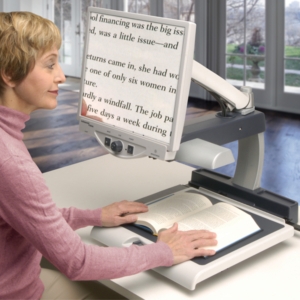
Closed Circuit Television
Cassandra when to Singapore School For The Visually Handicapped (SSVH). There is where Cassandra, who was brushed aside most of the times by her peers in the previous school, started making more friends who are also blind/visually impaired. And there is where she learned to travel independently from her other blind friends.
During her Primary School Leaving Examination (PSLE) in SSVH, she got help from the school by getting a Closed-Circuit Television (CCTV) which enlarged each alphabet in her question paper. The appropriate help from SSVH got Cassandra to graduate to the express stream in secondary school. Woohooo!
Secondary school
After which, Cassandra managed to go to Dunearn Secondary School, where there was a part-time resource teacher to assist her especially when she can’t read or write in braille. The teenage years were hard for Cassandra, especially when she had a deteriorating sight.
There was once in the early morning, Cassandra was rushing by running to catch her bus to school. As she was running across the road to catch her bus, she ran straight to a lamppost which was on the road divider, “Bang!”. She ended up fracturing her facial bone above her brow. “Ouch!”. Also because of her loss of vision, she was excused from a few subjects. This meant, lesser subject for her exams and lesser interaction about a common topic, etc, with her school friends. (Lesser social life)
But at the age of 15, Cassandra was representing Singapore in International sports for People with Disability in Swimming already. Which got her to travel to different parts of the world for the competitions. This got her an inaugural Disabled Sports Woman of the Year for her achievement in swimming by the then Singapore Sports Council for the Disabled (SSCD), which was awarded by Minister for the Ministry of Community Development (MCD). Other than the trophy, the award included an SGD$1000 cheque and a pair of air tickets to Jakarta.
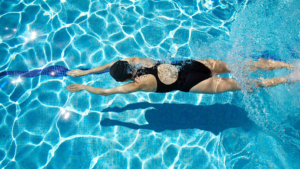
Tertiary
But once it was time for Cassandra to fly back to Singapore, the inspiration, motivation strive and the potential for tomorrow, will fall flat. Is it because of the culture/society then?
In the 1990s people who are blind or visually impaired do not pursue tertiary education because regardless of education, employers in Singapore were not willing to hire people who are blind or visually impaired. Even if they do, they get low paying jobs. But Cassandra decided to go beyond the odds and take up Disability studies in Adelaide, South Australia. Eventually, moving into a job which involves door to door sales.
She also picked up sports like bowling and cycling around 2002, a few years after getting her award. Wow!!!
Marriage
And she also got married after meeting a volunteer in the bowling clinic. They befriended each other, dated and eventually decided to exchange the ring. And at the age of 25, she gave birth to a beautiful little princess.
There were challenges Cassandra faced along the way when taking care of her daughter. Like feeding her and showering her. But the more hurting one was when Cassandra hears, “take good care of your poor Mom who cannot see”, to her daughter or calling her spouse a saint for marrying someone with a disability. She says, “Marrying someone with a disability only works when we accept that people with disabilities don’t have love lives or aren’t worthy partners”.
But eventually, their marriage did not last long, because of their difference they divorced.
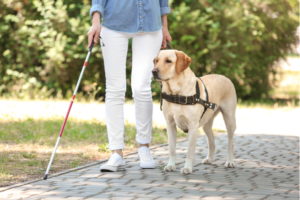
Guide Dog
However, she still had her daughter whom she loved to be with. Thus, she wanted to be living a more independent life to support herself and her daughter. Aside from earning a monthly salary from street busking, she also explored other independent mobility skills. That was when she chanced upon the knowledge of a guide dog which allows independent mobility and is a guardian angel for the blind. She immediately did further research, got herself some route planning apps (thanks to Steve Jobs), and mobility training.
Journey to independence
Meanwhile, she decided to study Counselling psychology, a study she truly wanted and was inspired by the psychologist, Dr. Octavio. She tried applying in some schools which turned her down, except for Executive Counselling and Training Academy (ECTA). She enrolled in the Master of Social Science for 2 years, where she had to learn theory and do practicum too. Life in the university was pretty smooth. And in the last year of her studies. Cassandra was recommended, by her classmate to be a counselor for the inmates in the prison. She was excited about the opportunity which lasted for only 4 months because she resigned after that. The main reason was that her application to the prison to give counseling to the inmates was rejected. Which is the main gist of the job.
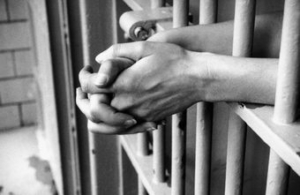
Prison inmates
She pushed on to go for interviews after interviews to find for a job. But because of the employer’s mindset then, on people with disability, she couldn’t get one. But that “Never Give-up” spirit of hers, prompt her to start her own counseling clinic named, “The Safe Harbour Counselling Centre” with the help of her university friend in 2011. Which is now located at Tanglin Shopping Centre, Singapore.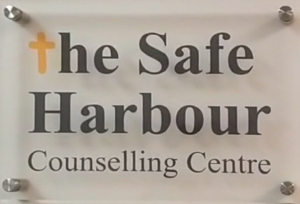
Meanwhile, Cassandra had a call from the Guide Dog Association of the Blind (GDAB) in Singapore, where she called previously to explore using a guide dog, said that there was a match between her orientation and another guide dog at Melbourne, in Guide Dog Victoria, found.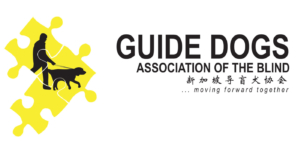 She then flew all the way to Melbourne, got a guide-dog management lesson and training for herself and with her newfound guide dog named, Esme.
She then flew all the way to Melbourne, got a guide-dog management lesson and training for herself and with her newfound guide dog named, Esme.
With more confidence, fuelling her independence, Cassandra was now back in Singapore. And she lived happily ever after. THE END…..
Challenges
I hope I could say that. But newer challenges came her way back in Singapore. Because society was not quite ready to see and accept a guide dog.
Here is a list of few of the problems Cassandra faced with her guide dog for her blindness:
- At the start, she couldn’t even get permission to enter Tanglin Shopping Centre, with her guide dog to where her counseling clinic is located.
- Stopped by an officer at Promenade train station because the officer did not accept that Cassandra was blind and the dog was a guide dog.
- She was photographed in the train, (I think for STOMP), for bringing a dog (a guide dog) in the train.
- One hot day when she was waiting for a bus with her daughter and Esme(guide dog) in the bus stop. 20 to 30 buses just when by. But when one bus eventually stopped to pick them up, a bus inspector came up in the future stops and got them to alight.
- When Cassandra was visiting the library with Esme (guide dog), the staff members will scream at them to take the dog out and call the security on them.
- Someone even threw an icy drink on her for bringing a dog in a shopping mall.
- When a taxi driver physically injures Cassandra because of discrimination against guide dog. This happened when the driver started driving off when Cassandra with Esme (guide dog) was pleading for the driver to ferry them with half of her body still in the doorway, causing the door hitting her.

“I believe that each one of us with disabilities, has a unique place in the world and serves a purpose in the bigger schemes of things. …. we all have a role to play to make the world we share a welcoming, liveable place for all.”. A statement made by Cassandra despite all those injustices caused by a faulty mindset or should I say the lack of appropriate awareness to the society, by society.
Cassandra was awarded the Singapore Woman Award in 2012. And later that year, she was appointed as a Fellow with the Social Innovation Park. An award that recognises leaders who are making systemic changes in the community that they live and work in.
And now, a psychotherapist, and a social advocate for people with disabilities and equal opportunities. With her works being featured in publications by the World Economic Forum, The Straits Times and 50 Years of ASEAN, an anthology of essays. At current, guide dogs are becoming a more usual sight to public transports, certain shopping malls and certain parts of Singapore. Thank you, Cassandra.
Message to the world
When asked (Cassandra) what do you have to tell to this world, she says: “Don’t assume! Disability is only one part of us. We have other identities too. So, take a moment to know the person for who he/she is.”
Check out Cassandra’s latest book, “A Place For Us”, which shares with you more on her advocacy journey.
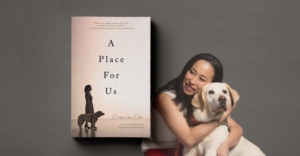
Believe in yourself, go Beyond your limits & Become your best!!
————————————————————————————————————————————

